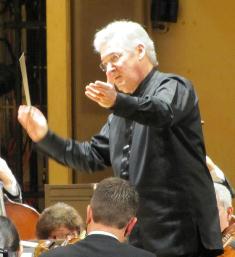It was cold and dreary outside Music Hall Friday morning,
but warm and sunny within. The overnight ice storm had largely melted away, though,
doubtless, fear of a difficult commute is what dampened attendance (800-900 by
my guesstimate). Guest artist and conductor Pinchas Zukerman, in his first visit
to the CSO since 2008, led a program suffused with warmth, from Beethoven’s
Romances No. 1 and 2, to Mendelssohn’s “Italian” Symphony.

Schoenberg’s “Verklärte Nacht” (“Transfigured Night”) about the transforming power of love lit up the hall even more.
It is no small feat to conduct and play an instrument simultaneously, but Zukerman’s prowess in that respect is supreme. During the Beethoven Romances, he stood in the space normally occupied by the podium, leading with small gestures of his body while playing the violin, and with his bow during passages for the CSO alone. It was pure harmony and he made it look easy.
In both Romances, his sound was limpid and filled with nuance. They were virtual songs without words, the violin often providing both melody and accompaniment via double stopping and ornamentation. The effect was exquisite, and there was an audible sigh in my corner of Music Hall at the end of the F Major Romance (No. 2).
Schoenberg’s “Verklärte Nacht” was inspired by a poem by Richard Dehmel about a pair of lovers walking in the moonlight. In it, the woman confesses that she is pregnant with another man’s child. Emotions are in turmoil, but by the end, the man affirms his love and they are reconciled. Originally for string sextet, it was arranged for string orchestra by the composer and revised in 1943. It is a tonal work, pre-dating Schoenberg’s creation of 12-tone composition, but highly chromatic in late romantic style.
It is a feast for strings, divided into multiple parts within sections, including many solo strands. Zukerman had the violas sit on the outside (where the cellos normally sit for CSO concerts), the better to project their alto voices. The emotion in the music was captured beautifully, beginning soft as a whisper with a descending motif in the cellos. It was like a conversation, with passions building, subsiding, and then building again. Love streamed through the music near the end, as the opening motif returned transformed and laced with soft arpeggios and gentle pizzicato. (More sighs from my corner of Music Hall.)
Sunny Italy held sway after intermission with the Mendelssohn Symphony. The CSO responded precisely to Zukerman’s direction, which was cleanly delineated with every detail in place. The musicians seemed delighted to be playing for him and their feelings were captured in inspired playing. He led with scarcely a pause between movements, each immediately in character, with its own vivid topography. There was soul in the Andante (inspired by a religious procession), grace in the third movement minuet and pure zest in the saltarello/tarantella finale. Playing by the CSO winds was outstanding here, as throughout the work, and the tarantella rolled off the strings like clockwork.
The concert repeats at 8 p.m. Saturday and 2 p.m. Sunday at Music Hall. Tickets, beginning at $10, are available by calling (513) 381-3300, or order online at www.cincinnatisymphony.org